The
UGC supports the institutions' academic research activities through
the allocation of the block grant, funding for research postgraduate
places and various competitive research funding schemes such as Areas
of Excellence, General Research Fund, Collaborative Research Fund and
Joint Research Schemes with the Mainland and overseas countries.
Through advocacy and financial incentives, the UGC also encourages
institutions further to strengthen and broaden their endeavours in
transferring knowledge, technology and other forms of research outputs
into real socio-economic benefits and impact for the community and
businesses.
In
2009-10, good progress has been made on new initiatives on research
matters in the higher education sector of Hong Kong. The Research
Endowment Fund started to earn investment income, thus providing
greater funding stability and certainty to institutions' research. A
portion of the Research Endowment Fund will also be used to support
the Theme-based Research Scheme, so that institutions may work on
research proposals on themes of a longer-term nature and strategically
beneficial to the development of Hong Kong. Furthermore, additional
resources have been given to provide an extra 800 research
postgraduate places by phases starting from 2009/10. Among them, 135
places have been reserved for the new Hong Kong PhD Fellowship Scheme.
New stream of recurrent funding also started to flow to the
institutions to strengthen their endeavours in knowledge transfer.
The
UGC established a Research Group to advise on the strategy to promote
research in the higher education sector. The UGC has continued its
efforts in taking the research to the community by organising lectures
and publishing newsletters to share the research findings and policy
recommendations with the community.
(A) UGC Funding Support for
Institutions
(a)
Research Expenditure and Funding
The UGC-funded institutions continue to pursue research vigorously. Their
reported aggregate expenditure on research in 2008/09 amounted to
$6,650 million, representing 41% of their total departmental
expenditure, and 0.41% of Hong Kong GDP. The total research output
items was 24 634, of which 17 719 were refereed.
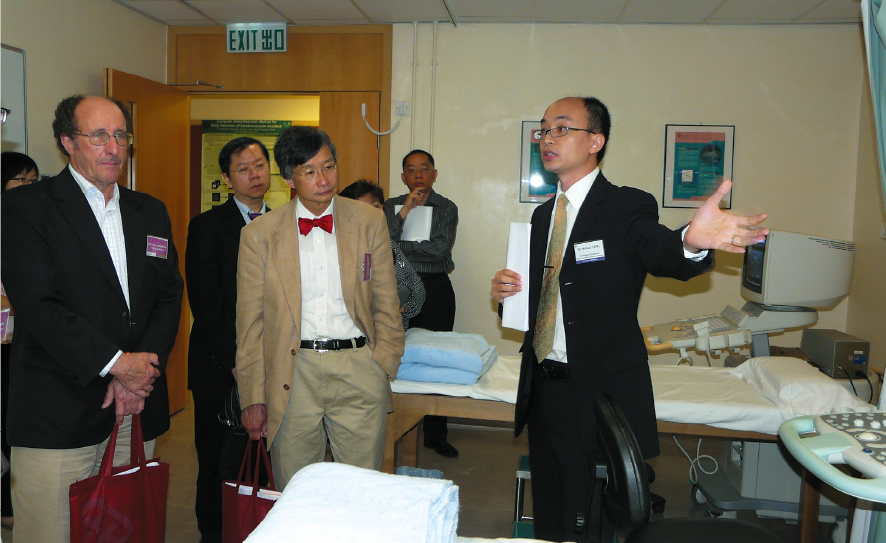
|
Visit
by the RGC to PolyU on 11 June 2009 |
UGC and RGC funding, in the form of
block grants and earmarked grants respectively, constituted the bulk
of research funding for the institutions. Together, the two sources of
funding made up about 77% of the total research expenditure in 2008/09
- breakdown is at Chart 6.
|
Chart
6: Research Expenditure of UGC-funded Institutions 2008/09
|
|
Source
of Funding |
Amount
(HK$m)
|
|
|
UGC
|
4,510.5
|
68%
|
|
RGC
|
582.4
|
9%
|
|
Other Government Funds
|
393.3
|
6%
|
|
HK Private Funds
|
1,033.7
|
15%
|
|
Non-HK
|
130.1
|
2%
|
|
Total
Ratio of expenditure on
research to Hong Kong’s GDP
|
6,650.0
0.41%
|
|
|
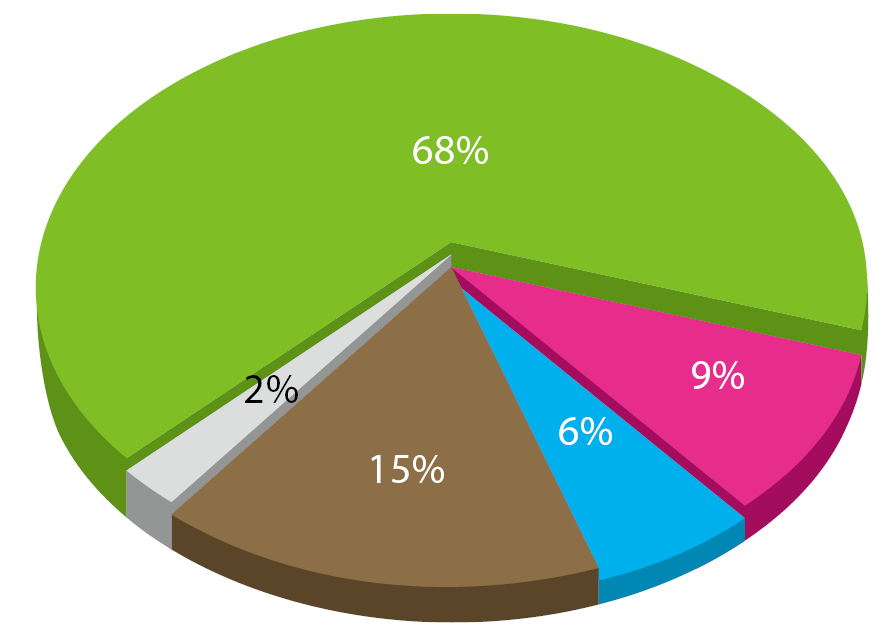
|
(b) Earmarked Research Grant (ERG)
Apart from the block grants
allocated by the UGC, the ERG is the largest single source of funding
for supporting academic research in Hong Kong's higher education - and is managed and disbursed by the RGC. For 2009/10, the RGC
administered a total of $745 million through its various funding
schemes, an increase of about 14% as compared with 2008/09. There are
four main funding schemes under the RGC: the General Research Fund;
the Collaborative Research Fund; the Direct Allocation; and the Joint
Research Schemes. The distribution amongst the major funding schemes
is set out in Chart 7.
|
Chart
7: Budgeted Distribution of Earmarked Research Grant 2009/10
|
|
Distribution
of Funding |
Amount
(HK$m)
|
|
|
GRF
|
596.9
|
80.2%
|
|
CRF
|
57.5
|
7.7%
|
|
Direct Allocation
|
65.0
|
8.7%
|
|
Joint Research Schemes
|
25.6
|
3.4%
|
|
Total
|
745.0
|
|
|
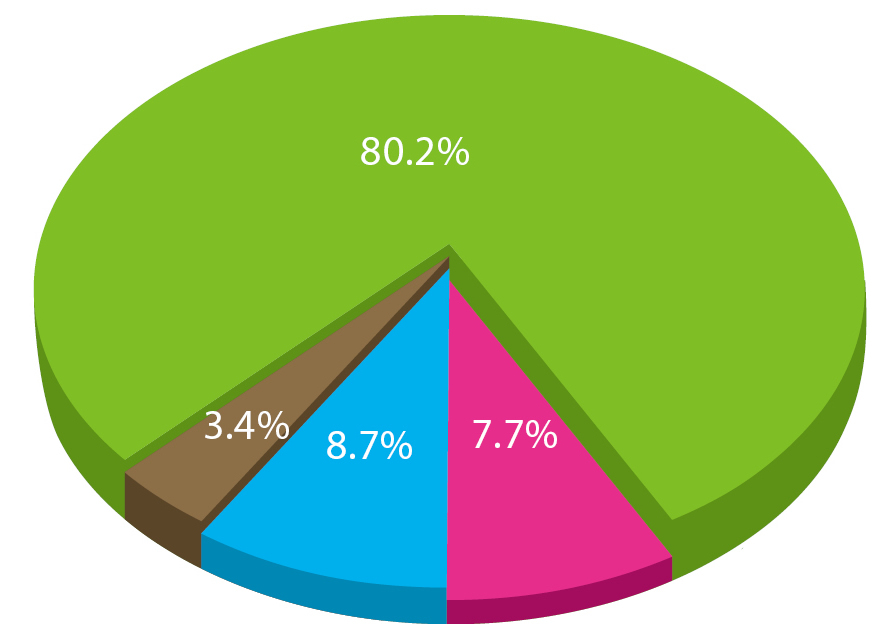
|
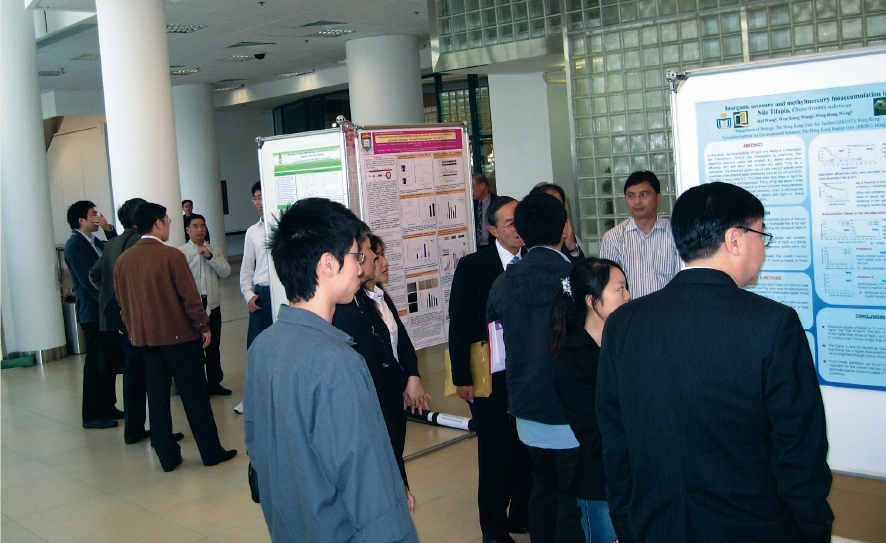
|
CRF
Symposium December 2009 Poster Display |
Details of how these schemes operate
and the success rates can be found on the RGC website and in its
Annual Report.
(c) Research Endowment Fund
The $18 billion Research Endowment
Fund (REF) was established in February 2009 after approval was granted
by the Legislative Council. The Fund has been set up as a trust under
the Permanent Secretary for Education Incorporated (the Trustee). The
UGC advises the Trustee on the policies and procedures governing the
operation, development and investment of the Fund and the provision of
grants to be set aside from the Fund for distribution to the
institutions for the purpose of conducting, promoting and assisting
research. Out of the $18 billion, the investment income of at least
$14 billion will be used to replace, from the 2010/11 academic year
onwards, the bulk of the existing earmarked research grants
distributed annually to the RGC, thus providing greater funding
stability. In addition, the investment income from up to $4 billion of
the REF will be deployed to support theme-based research, thus
allowing the institutions to work on research proposals on themes of a
longer-term nature and strategically beneficial to the development of
Hong Kong.
(d) Fifth Round Areas of
Excellence (AoE) Scheme
The "Areas of Excellence"
Scheme was in place to facilitate the formation of quality research
consortia to explore important questions across a broad range of
disciplines, and thus it buttresses inter-institutional and
inter-disciplinary collaborative links. The longer term funding
together with the allocation of RPg places provided for by the scheme
enable high calibre research teams to pursue high impact and forward
looking projects.
The following five proposals were
selected for funding in the 5th Round AoE exercise in September 2009:
●
Institute of Network Coding
(co-ordinated by CUHK)
●
The Historical Anthropology
of Chinese Society (co-ordinated by CUHK)
●
Center for Nasopharyngeal
Carcinoma Research (co-ordinated by HKU)
●
Institute of Molecular
Functional Materials (co-ordinated by HKU)
●
Theory, Modeling, and
Simulation of Emerging Electronics (co-ordinated by HKU)
The total funding amount for the
five proposals was $378 million (including 15% on-costs), and about 60
research postgraduate places were allocated.
(B) Research Policy
The
UGC provides funding to support research activities of institutions by
means of the following ways:
(a)
Research element of the block grant;
(b)
Research Postgraduate places; and
(c)
RGC funding.
Both
the UGC and institutions have the common wish to enhance the
competitive element of research funding, and improve the existing
methods of allocating research funding. In this connection, the
Research Group started conducting two major reviews in 2009-10. One
was on the way to conduct the Research Assessment Exercise (RAE) which
has been the main factor affecting the allocation of the Research
element of the block grant; and the other one on how to enhance the
effectiveness and competitiveness in the allocation of RPg places and
research funding. The Research Group will draw up recommendations for
consulting the institutions. It is intended that this will tie in with
the Higher Education Review and with the planning of the 2012-15
triennium funding.
(C) Hong Kong PhD Fellowship
Scheme
The
Hong Kong PhD Fellowship Scheme was launched in September 2009 to
attract the best and brightest students around the world (including
Hong Kong), irrespective of their country of origin and ethnic
background, to pursue their PhD studies and research in UGC-funded
institutions.
The
Fellowship provides a monthly stipend of $20,000 and a conference and
research-related travel allowance of $10,000 per year for the awardees
for a period of three years. It is expected about 135 PhD Fellowships
will be awarded each year starting from 2010/11.
To promote to the international
academic community the Scheme and Hong Kong's PhD programmes, and
more importantly, Hong Kong's institutions, the RGC Chairman, and
representatives from institutions conducted outreach visits in
September and October 2009 to distinguished universities in various
countries in Southeast Asia and the Indian Sub-continent. Some 3 000
applicants from 100 countries submitted their applications by the
deadline on 1 December 2009. The result of the 2010/11 exercise of the
Scheme was announced in March 2010.
This prestigious Scheme will unite
top international research postgraduate students and Hong Kong's
world-class research institutions. We hope that it will nurture the
best students excelling in their chosen fields of research, with
elevated knowledge and global outlook, and poised to cope with the
challenges of a changing world.
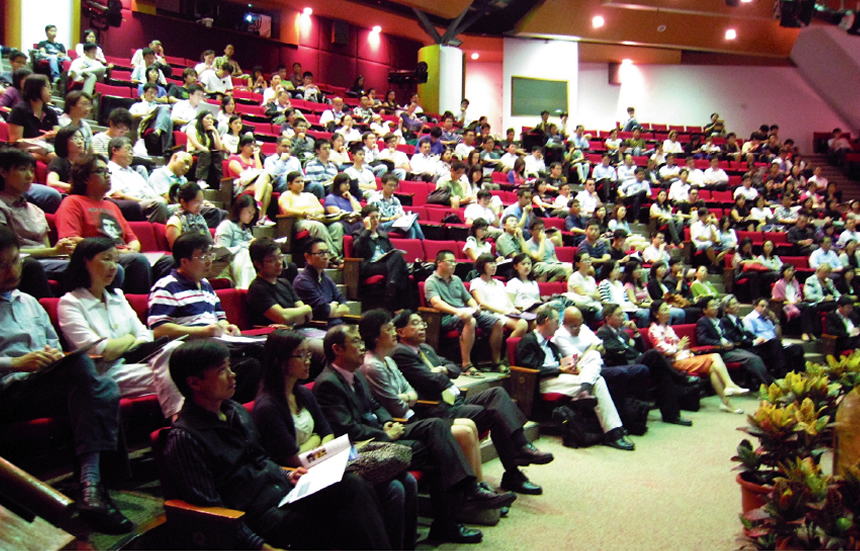
|
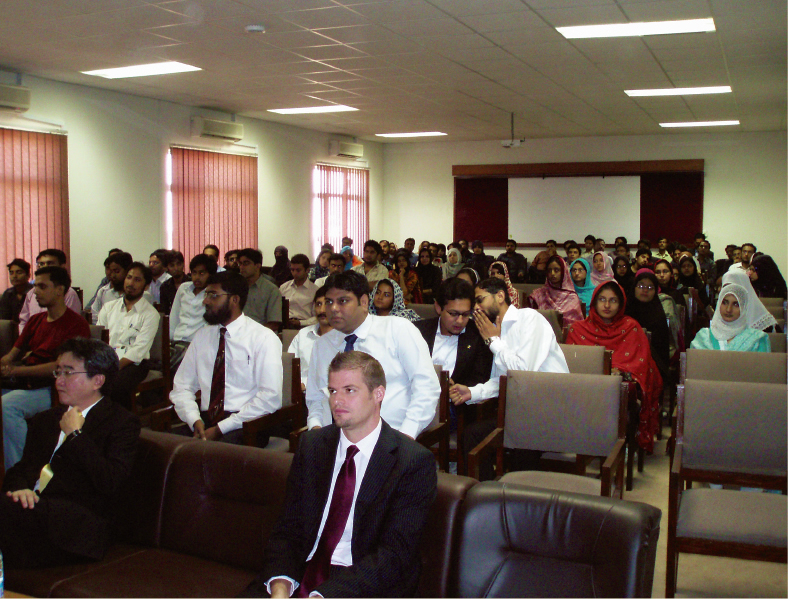
|
|
Information
Session on the Hong Kong PhD
Fellowship Scheme in Hong Kong |
Information
Session on the Hong Kong PhD
Fellowship Scheme in Pakistan |
(D) Knowledge Transfer
Not
only does the UGC provide funding support for research activities in
institutions, it also promotes and incentivises the transfer of
knowledge - in both technological and non-technological disciplines - between institutions and the society, with a view to bringing about
socio-economic impacts and improvements to the community and
businesses.
In
2009/10, the UGC introduced an additional stream of recurrent funding
earmarked for the institutions to strengthen and broaden their
endeavours in "knowledge transfer". Institutions have responded
favourably to the new funding: not only do they embrace "knowledge
transfer" as the third pillar of their core activities (together
with teaching and research), they have all set forth
institutional-wide strategy, policies, action plans and performance
targets to systemise and intensify their efforts in knowledge transfer
which are commensurate with the institutions' respective roles and
missions. Institutions will submit annual reports to the UGC to
account for their progress in this regard.
With
the institutions' concerted and more conscious effort in knowledge
transfer, academics and researchers are given more opportunities to be
inspired by forging closer ties with the wider community, and the
community may enjoy greater, realisable benefits from the knowledge
transferred from the institutions. This two-way process enriches
institutions' research policies, and thereby enhancing the
international competitiveness of the local higher education sector.
Chart 8:
Allocation of Knowledge Transfer Recurrent Funding to Institutions,
2009/2010
| |
(HK$m)
|
| CityU |
6.55 |
| HKBU |
3.02 |
| LU |
1.22 |
| CUHK |
11.63 |
| HKIEd |
1.39 |
| PolyU |
8.06 |
| HKUST |
7.37 |
| HKU |
11.84 |
|
| Total |
51.08 |
|

















